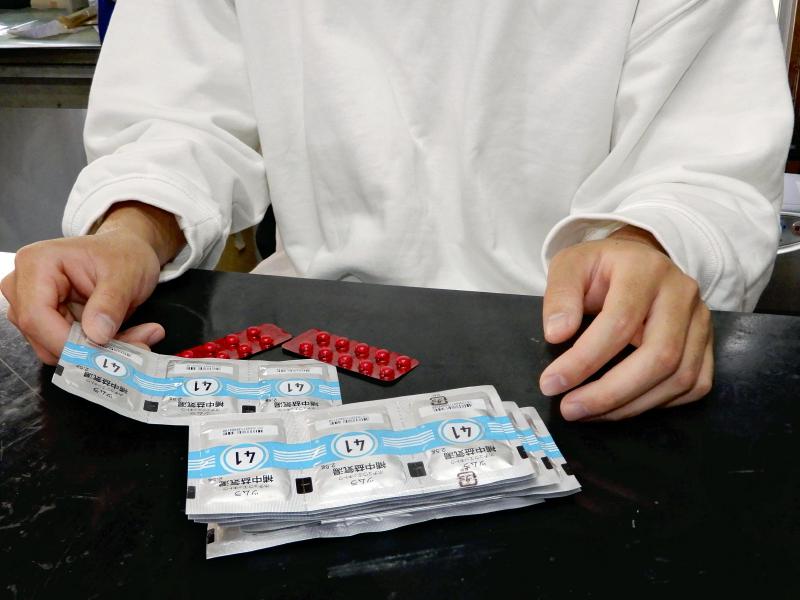
A Saitama Prefecture high school student displays Chinese herbal medicine and tablets prescribed to him to treat the aftereffects of COVID-19.
1:00 JST, June 4, 2022
A growing number of people are suffering aftereffects after becoming infected with the coronavirus that causes COVID-19. Fatigue, coughing and memory impairment are among the cited symptoms, and there have been calls to establish a consultation service and offer pertinent medical treatment.
Even people who had relatively mild symptoms after becoming infected with the currently prevalent omicron variant have reported long-term sequelae.
Three months after contracting the coronavirus in February, a high school student in Saitama Prefecture still complained of a strong weariness. “I want to return to how I felt prior to catching the virus,” said the 18-year-old, who continues to receive treatment.
Shortly after falling ill, the student developed a fever of 40 C, but the case was relatively mild and his fever dropped in a few days. However, after returning to school he felt unable to concentrate in class and had difficulty sitting and maintaining his posture.
As his symptoms worsened, he visited in mid-April Kodaira Hospital in Toda in the prefecture, which has an outpatient clinic that deals with COVID-19 aftereffects. He began receiving treatment based on Chinese herbal medicines and other drugs but still finds it difficult to attend school. “The university entrance exams are coming up and I don’t know if my health is going to improve,” he said.
More than 180 people have visited the clinic since January, when the omicron variant became prevalent. “Previously, we had a lot of elderly patients, but now we’re seeing more and more young people,” the hospital’s director, Makoto Kodaira, said.
Coughing, fatigue
After analyzing cases reported to COVID aftereffects consultation service offices at hospitals run by the Tokyo metropolitan government and Tokyo Metropolitan Health and Hospitals Corporations, the metropolitan government found that 97% of 2,039 people who were infected with the virus between January and April had mild or weak symptoms at the time of infection. Also, 74% had no underlying disease, and more than 70% were aged 20-59.
Cases of fatigue and prolonged coughing were particularly notable, while the number of patients who suffered from olfactory and taste disorders — common during the outbreak of the delta variant and before — decreased.
According to a report from the National Center for Global Health and Medicine and other entities, the rate of patients who develop aftereffects is much lower with the currently dominant omicron variant than with the delta or previous variants.
“An extremely high number of people have contracted the omicron variant, so a lot of people could potentially suffer from aftereffects,” said Kochi University Prof. Akihito Yokoyama, a specialist in respiratory medicine.
It has also been reported that about 10% of people hospitalized during and before the delta variant outbreak still suffered from aftereffects a year after contracting the virus. According to sources, aftereffects may be more prolonged in cases involving the omicron variant.
Consultation system
Effective treatments for coronavirus sequelae have yet to be established.
Some overseas reports indicate that two doses of COVID-19 vaccine halve the incidence of aftereffects when compared to unvaccinated patients. Yet, research on prevention and treatment continues.
Consultation services vary from municipality to municipality and most treatments focus on alleviating symptoms.
According to a survey on prefectural governments and major cities conducted by the Health, Labor and Welfare Ministry in October, 90% of the 134 local governments that responded to the survey had no consultation service for coronavirus aftereffects, and less than 10% had an outpatient clinic specializing in the treatment of sequelae.
Nearly half of the municipalities had no plans to establish a consultation system.
In response to the situation, the ministry in April published a medical treatment handbook outlining standard procedures for treating COVID-related aftereffects.
Thanks to the handbook, it is expected that physicians from a wider range of fields will be able to provide treatment, even in cases where a medical facility lacks a specialist outpatient clinic.
The handbook classifies aftereffects in several categories — coughing and breathlessness as “respiratory symptoms” and memory impairment as a “neurological symptom” — and explains methods for examination and medical treatments. The handbook also provides guidelines for specialist referrals.
Saitama Prefecture and the Saitama Medical Association have independently produced casebooks detailing specific courses of treatment. Yuichi Maruki, executive director of the medical association, said: “Most aftereffects can be dealt with using daily medication. We need to create a system involving many doctors to help put patients’ minds at rest.”
Top Articles in Society
-

Man Infected with Measles May Have Come in Contact with Many People in Tokyo, Went to Store, Restaurant Around When Symptoms Emerged
-

Woman with Measles Visited Hospital in Tokyo Multiple Times Before Being Diagnosed with Disease
-

Australian Woman Dies After Mishap on Ski Lift in Nagano Prefecture
-

Foreign Snowboarder in Serious Condition After Hanging in Midair from Chairlift in Nagano Prefecture
-

Record-Breaking Snow Cripples Public Transport in Hokkaido; 7,000 People Stay Overnight at New Chitose Airport
JN ACCESS RANKING
-

Japan Institute to Use Domestic Commercial Optical Lattice Clock to Set Japan Standard Time
-

Israeli Ambassador to Japan Speaks about Japan’s Role in the Reconstruction of Gaza
-

Man Infected with Measles May Have Come in Contact with Many People in Tokyo, Went to Store, Restaurant Around When Symptoms Emerged
-

Prudential Life Insurance Plans to Fully Compensate for Damages Caused by Fraudulent Actions Without Waiting for Third-Party Committee Review
-

Woman with Measles Visited Hospital in Tokyo Multiple Times Before Being Diagnosed with Disease






















